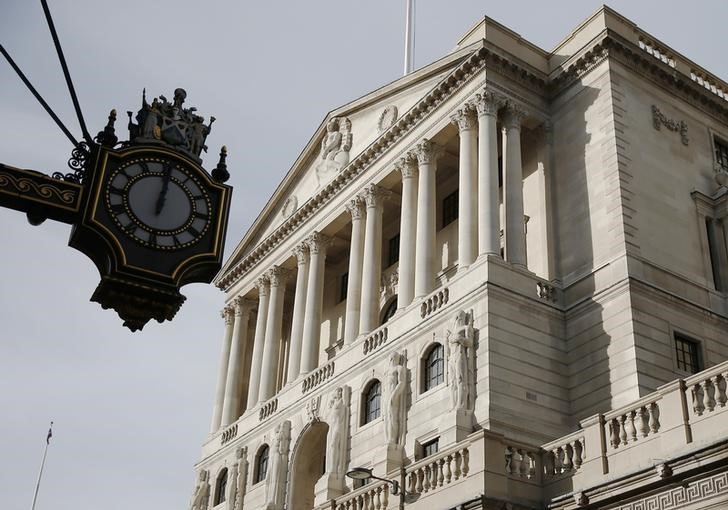By Andy Bruce and David Milliken
LONDON (Reuters) - The Bank of England said on Thursday that sterling's strong performance over the past month could soften an expected surge in British inflation next year, as its policymakers voted unanimously to keep interest rates unchanged.
Officials saw a stronger global economy - and the chance of a further boost from the spending plans of U.S. President-elect Donald Trump - but also warned of greater risks from Europe, China and other emerging markets.
The BoE kept rates at a record low 0.25 percent at its December meeting which ended on Wednesday. It left its plans for government and corporate bond purchases unchanged, in line with economists' forecasts in a Reuters poll.
Last month the BoE dropped plans to cut rates again and instead adopted a neutral stance for policy after conceding it had been wrong-footed by the resilience of Britain's economy after the shock of June's vote to leave the European Union.
On Thursday, BoE officials noted sterling had appreciated by over 6 percent since its latest forecasts in November.
"This would by itself point to less of an overshoot in inflation relative to the target in the medium term, though month-to-month volatility was to be expected as market participants' views on the United Kingdom's future relationship with the European Union continued to evolve," the BoE said.
They also flagged signs of overheating Chinese house prices and lending, and concerns about Italian banks.
"We think the bar is high for tightening (BoE) policy in the current uncertain environment," HSBC economist Elizabeth Martins said in a note to clients.
Sterling sank to a two-week low against the U.S. dollar after the BoE's announcement. Traders said this mostly reflected dollar strength after the U.S. Federal Reserve tightened policy for only the second time in a decade on Wednesday. [GBP/]
Some economists say the BoE would probably be following suit were it not for uncertainty around the outcome of the EU exit talks which are due to start next year.
British inflation hit its highest rate in more than two years last month, though at 1.2 percent it still remains below the BoE's 2 percent target.
The BoE expects inflation to hit about 2.7 percent by this time next year as sterling's plunge pushes up import prices, probably hurting spending power.
So far, consumer spending has been robust since June's Brexit vote. While retail sales growth slowed last month from October's 14-year high, sales volumes were still 5.9 percent higher than a year ago, official data showed on Thursday.
But inflation pressures are likely to intensify. Crude oil prices hit their highest since mid-2015 this week.
Pay growth might also respond more to higher inflation than it had in the past as unemployment was back to its pre-financial crisis lows, the BoE said.
Policymakers repeated that they could tolerate some overshoot of their inflation target, but only within limits.

"The MPC remains committed, as always, to taking whatever action is needed to ensure that inflation expectations remain well anchored, and that inflation returns to the target in a sustainable fashion," BoE Governor Mark Carney said.